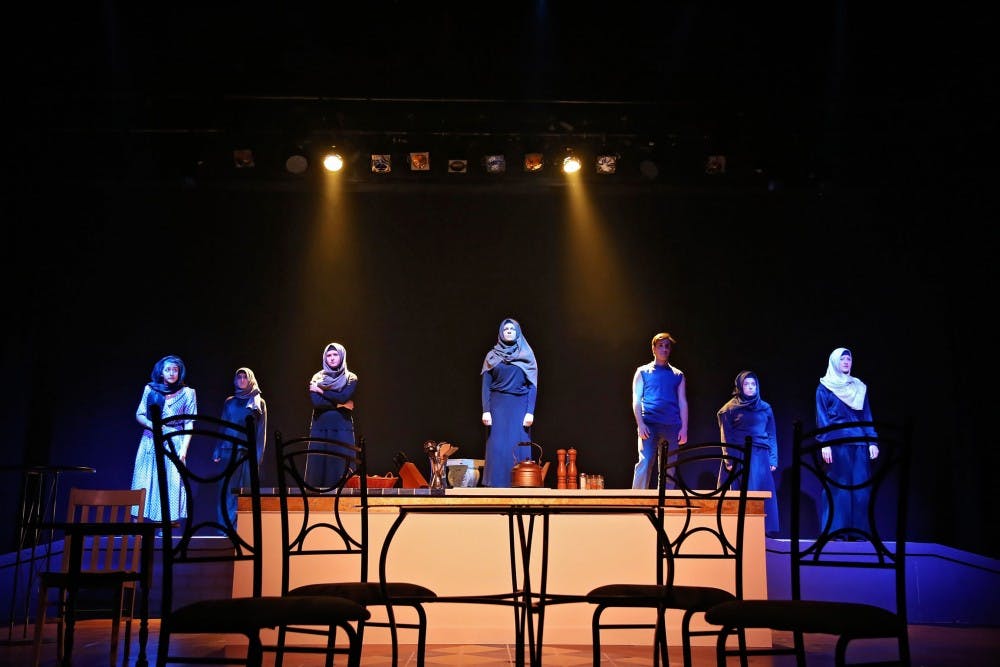By Austin Lindner | The Echo
Everything in life has a taste.
Conflict is sour. Happiness is sweet. Loss is bitter.
The flavors of life are often mixed. No carefree event comes without the tang of sorrow. No tearful moment comes without the sweet tint of a silver lining.
When the tastes combine, they provide us with the richness and complexity that make life poignant.
This intricacy of taste serves as the backbone for "The Arab-Israeli Cookbook."
Created by playwright and actor Robin Soans, this two-act production which will kick off Taylor's 2015-16 theatre season. Soans has a passion for a documentary style of theatre, in which the characters reenact interview subjects' experiences onstage, using the transcript of their interviews.
For "Cookbook," Soans traveled to the Gaza Strip and the West Bank, where he interviewed ordinary people from both sides of the Arab-Israeli conflict.
Using life experiences as ingredients, Soans compiled his research into a production including 39 characters, played by 15 actors in Taylor's adaptation. Their overlapping storylines and monologues show the complexity of the political and economic situation in Israel and its neighboring countries.
Whether the characters begin debating the conflict passionately or treading on the subject with caution, violence and terrorism are an everyday reality for each of them.
"Everything appears normal on the surface, but there are cracks," says Rena, an American woman now living in Jerusalem. Rena is played by senior Morgan Turner, who exudes maturity and charisma through her character's outsider perspective.
Yet through the ever-shifting landscape of the political conflict, food is the stable factor connecting each character to the others. Whether an upperclass Jew or an Arab refugee, each person onstage is knit together by the presence and passion for cuisine.
Food also serves as the catalyst that allows the story to flow. A casual mention of a simple ingredient can trigger an emotional discussion about a bomb scare in a crowded falafel restaurant or a loved one lost to violence and hostility.
In "Cookbook," meals represent security-recipes preserve thousands of years of heritage and tradition, unwavering in the face of the bombings.
Food highlights cultural differences and class struggles. Characters offer rigidly traditional cooking advice, often refusing to open their minds to the possibility of another flavor entering the mix. In some instances, ingredients readily available to some of the players are envied by others.
Food also reflects some of the play's most poignant moments of heartache and loss. When an Arab mother, played by senior Leah Murphy, retells the story of her son dying at the hands of Israeli militants, she recalls seeing him for the last time at lunch.
"His last meal was stuffed zucchinis and yogurt," she says, Murphy's voice breaking as she glances into the audience with grief-stricken eyes.
And through both moments of horror and elation, food most importantly reflects the humanity of the characters on stage. Cooking represents a zest for life, a factor both sides of the conflict fight to control in order to maintain their sanity and sense of hope.
In Taylor's interpretation of "Cookbook," the show's staging is simple, with three separate seating areas in front of a simple black backdrop. A lone kitchen counter stands in the center for characters to cook and prepare food in front of the audience, the scents through the theatre with each experience and anecdote. With a modest set like this, the production must rely on the emotional energy of its performances to fill the room, and thanks to a worthy cast, it does.
The 15 actors perform with a sense of reverence and responsibility for the real people whose poignant words gave life to this production. With honest inflections, a conversational tone and genuine expressions, the performers honor the source material and give equal credence to both sides of the conflict.
A verbatim play like "Cookbook" can easily turn into a sensationalized political message or melodrama if misinterpreted. But under the careful direction of Jessica Rousselow-Winquist, chair of the communication department, neither side of the conflict is victimized for the sake of drama, and neither side is a hero for the sake of convenience. In her last turn directing a production with Taylor University before retiring, Rousselow-Winquist dwells on the idea that the true enemy threatening to starve the characters of peace is the blend of hate coming from both sides of the turmoil.
While "Cookbook" offers sweet moments of mealtime fellowship and community to cleanse the audience's palate, the production's moments of bitterness are when the show becomes truly memorable. Instead of shying away from the brutal details, the actors beg their audience to partake in the pain and loss of the characters. The grief drives the characters' yearning for peace and it is in this grief that the play truly comes to life as a work of art.
And in the face of such bitterness, "Cookbook" also shows that sometimes our greatest weapon lies in simple, ordinary acts-even the mundane cooking of a simple dish. When aggression and bloodshed from all sides of conflict try to steal our humanity, it is through the everyday details of our lives that we refuse to let go.
"That will to continue-it's our engine, it drives us," says Rena. "If they keep us from living a life, they've won."
Performances of "The Arab-Israeli Cookbook" will take place at 8 p.m. on Sept. 25 and 26 and 2 p.m. on Sept. 27 in Mitchell Theatre. Tickets are $7.






